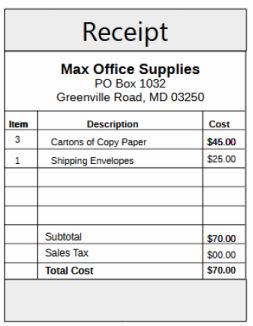
Receipt


Before we install WooCommerce, there are a few pages we should set up first:
In WordPress, pages are for static content like “About Us” or “Contact” pages, which typically remain unchanged over time. Posts, on the other hand, are for dynamic content like blog entries or news updates, which are organized chronologically and can be tagged and categorized. Comments are great for blog posts but don’t always make sense on pages. Let’s turn them off:
Now, when you revisit your About page and scroll down, you should no longer see the comments box, making it more “page-like”.
Permalinks in WordPress are the permanent URLs of your posts, pages, categories, and other archive pages on your website. These URLs are designed to be permanent and should not be changed, hence the name “permalink.” They help create a URL structure that is easy for both humans and search engines to understand and share.
Pretty Permalinks: These are SEO-friendly and attractive, usually containing words such as the title of the post or page, post category, or tag name. For example: http://example.com/2012/post-name/
Pretty permalinks are SEO-friendly because they include keywords from the post title or category, making URLs more descriptive and relevant to search engines. This helps improve search engine rankings and provides a better user experience by creating readable and memorable URLs.
To create prettier permalinks:
Return to your About page and refresh it to see the updated permalink. This will apply to your About page, Contact page, and future Product pages.
If you’re considering starting an online store, WooCommerce offers a robust and flexible platform to build your business. It is a popular e-commerce plugin for WordPress, and it’s a great choice for several reasons:

SEO stands for Search Engine Optimization, and it’s the practice of enhancing the visibility of a website or a web page in a search engine’s organic results. In simpler terms, it’s about making your site more attractive to search engines like Google, Bing, and even Etsy’s internal search, so that you appear higher in search results. :
The importance of keywords in SEO can not be over stated. Keywords are the terms and phrases that users enter into search engines when looking for specific information, products, or services. They’re like the secret sauce of search engine optimization (SEO).
Here’s why keywords are important:
For instance, if you have a blog about healthy recipes, keywords like “easy vegan recipes,” “gluten-free desserts,” and “low-carb meals” can help your content reach those who are specifically looking for these types of recipes.
Here are some Etsy seller SEO Tips:
Using GnuCash as an Etsy seller can help you efficiently manage your shop’s finances, track income and expenses, and generate reports for tax purposes.
Before you begin you should
1.Install GnuCash
2. Download the Etsy Chart of Accounts
In this tutorial I will show you how to record the sales tax you pay to the government in GnuCash.
You can install GnuCash on Windows, macOS, and various Linux distributions; essentially, most common desktop operating systems are supported. Windows: GnuCash is available for recent Windows versions like 8, 10, and 11, macOS: You can install GnuCash on macOS versions starting from “High Sierra” (10.13). Linux: GnuCash is readily available for most popular Linux distributions and can be installed through package managers.
In this tutorial, I will go over the simple steps to installing GnuCash on a windows desktop or Laptop computer!
Gnucash is a free product that has been around since 1997 and is a good alternative to Commercial accounting software programs. While GnuCash is well suited for personal finances, it is also powerful and versatile enough to keep track of all your business financial needs, from the simple to the very complex. GnuCash makes running the business so easy, that you can focus on the heart of what you do. It is an excellent and powerful program for a free product. It is designed to be easy to use yet powerful and flexible, enough for small business bookkeeping.

Deciding what type of business to start involves considering several factors, including your interests, skills, market demand, and the resources available to you. Here are some steps to help you determine the best business for you:
Here are a few examples of popular Online and Offline business ideas to consider:
Choosing the right business type requires thoughtful consideration and planning. Reflect on your passions, skills, market opportunities, and resources to find the best fit for you.